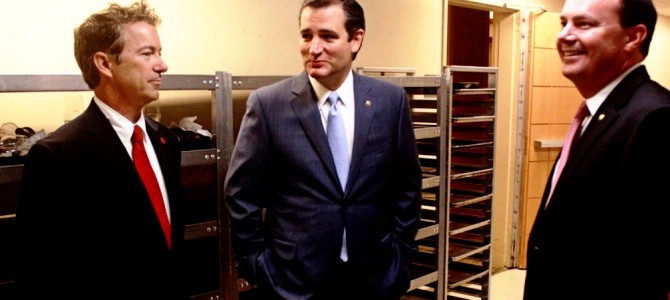So this week brings the annual gathering of the Conservative Political Action Conference, now decamped to just outside the Washington beltway. CPAC has evolved over the years – where in the past it was a meeting of fusionist minds, bringing together the disparate strands of the social, economic, and defense agendas of the conservative movement, today it is a more libertarian group, with individuals focused primarily on domestic and fiscal political issues. CPAC has been a site of significant moments in conservative history – consider Ronald Reagan’s triumphant speech in 1981, which framed the fusionist agenda on the right for more than a decade to come:
Our goals complement each other. We’re not cutting the budget simply for the sake of sounder financial management. This is only a first step toward returning power to the States and communities, only a first step toward reordering the relationship between citizen and government. We can make government again responsive to people not only by cutting its size and scope and thereby ensuring that its legitimate functions are performed efficiently and justly. Because ours is a consistent philosophy of government, we can be very clear: We do not have a social agenda, separate, separate economic agenda, and a separate foreign agenda. We have one agenda. Just as surely as we seek to put our financial house in order and rebuild our nation’s defenses, so too we seek to protect the unborn, to end the manipulation of schoolchildren by utopian planners, and permit the acknowledgement of a Supreme Being in our classrooms just as we allow such acknowledgements in other public institutions.
There have been other moments of note at other CPACs – mostly as dry runs for presidential contests – but given the context of the times, I think the most interesting moment thus far came at a foreign policy event piggybacking on the main conference, organized by Frank Gaffney and featuring Ted Cruz. Skip to the 28:30 mark of this video to see his remarks about John McCain and Rand Paul:
Here are the remarks, as transcribed by Dave Weigel:
"The Republican Party — you can point to two points on the spectrum, where Republicans lie. On one side you have the views of John McCain. The other end of the spectrum, you have the views of Rand Paul. Now, with respect, my views are very much the views of Ronald Reagan, which I would suggest is a third point on the triangle."
He gave some examples. “I agree with Rand Paul that we should not engage with military conflict in Syria,” Cruz said. The Obama administration had lost him when it described a strike not to achieve a long-term goal but to punish the state for contravening international law. “Tut tut, you violated international law, you’re no longer welcome in our faculty lounge,” snarked Cruz. But he agreed with John McCain on Iran.
Now this is interesting stuff, with more indications about the nature of the undercurrents in the 2016 stakes than Cruz’s red meat remarks to the main CPAC audience, where he praised Reagan and Ron Paul. Cruz is framing the views on foreign policy within the Republican Party as having John McCain on one end, Rand Paul on the other, and himself in the middle, shepherding Reagan’s Jacksonian legacy.
Consider the context of these remarks in light of my piece on the need for a clear-eyed view of foreign policy on the right. Over the past few years, due to hypocrisy and mismanagement, the Republican Party has lost its status as the “adult in the room” – the paternalist party who you could trust to run things responsibly. Within the arena of fiscal policy, that lack of trust led inevitably to the rise of the Tea Party and a backlash against pork barrel spenders. In the foreign policy space, that distrust has led to a rise of isolationist and non-interventionist voices being taken more seriously by the conservative base.
The excitement over candidates like Rand Paul come from that source. Millennials have already tuned out, and will tune out, those they view as “warmongers” or anything of the kind (as they share listicles of “the 15 countries John McCain wanted to bomb”). This makes for a dangerous situation on the right, as a return to traditional tough-sounding Jacksonian rhetoric (of the sort Cruz deployed today) will require voters to have faith that the big stick will not be deployed too eagerly or frequently, and that American lives will only be put at risk in situations where there is a clear path to victory, a clearly important issue at stake, and we are taking sides to seek the defeat of a clearly identified enemy.
The American people need to trust the judgment of their leaders – leaders who can make the case for the importance of America retaining military power in a dangerous world, but who can also be trusted not to engage that power in every situation, backsliding into the temptation to be the world’s policeman or ending tyranny everywhere. The absence of a serious, adult voice on these issues has led us to the current circumstance. This vacuum of leadership outside of McCain and Lindsey Graham – and next up, Marco Rubio and Tom Cotton – leads to a defined “Republican view” from the media’s perspective which allows the GOP to be framed as the party of war – one where the Paul/Mike Lee/Justin Amash side of the equation is too often ignored.
Cruz’s comments make me look forward to the 2016 debate all the more. The distinctions within the right on foreign and security policy are critical ones, and it’s high time we had a healthy debate about where the country ought to go. Let the representatives of these different viewpoints make their case from the stage, and let the people decide.









